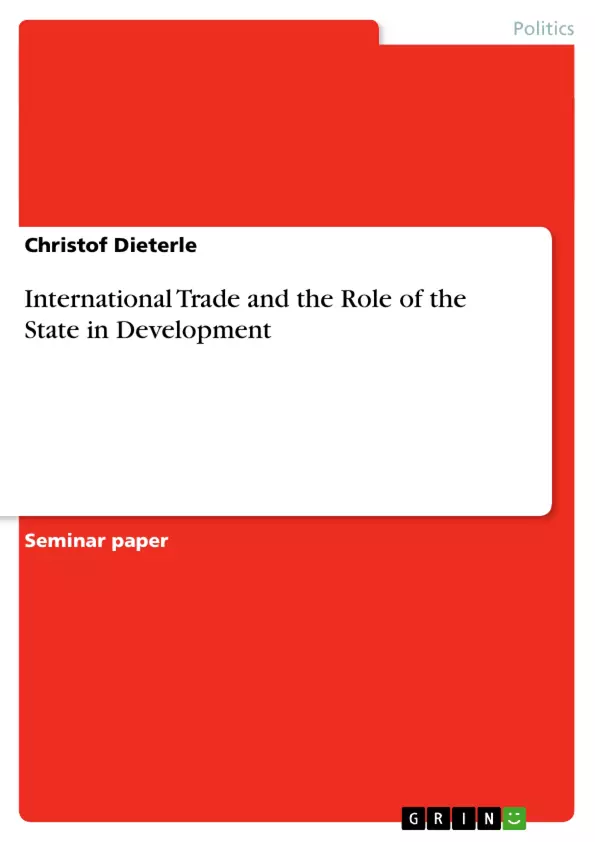Introduction
One aspect of the study of International Political Economy (IPE) is the flow of goods, services and capital between the economies of different states. Is there a free flow of these things or is the flow somehow restricted and if so, why is this case? To answer these questions I will examine three periods in history and try to show the theoretical implications that can be seen in the respecti ve free or restricted flows of goods, services and capital.
The first historical period I will examine is the period of great restrictions on trade and the flow of capital, namely the seventeenth and eighteenth centuries in Europe, mostly associated with the term mercantilism. The second period is the time after the Second World War in Germany, where trade and financial policies were applied to stimulate domestic growth. The third period begins with the collapse of the Bretton Woods System in the early 1970s and continues to this day with an emphasis on fewer controls and restrictions on trade and the flow of capital. Of course, this periodization is not the only way of looking at historical events and there are, within these large time frames, discontinuities. However, I believe it is helpful to define the mentioned periods rather generously, because this helps to discover certain general aspects that can be associated with different theories of trade and finance.
Inhaltsverzeichnis (Table of Contents)
- Introduction
- Mercantilism
- The Post World War II Era
- The Post Bretton Woods Era
- Theoretical Approaches to the State and Underdevelopment
- Options and Recommendations
- Infant Industries
- Promote Export/Discourage Rent-Seeking
- Conclusion
Zielsetzung und Themenschwerpunkte (Objectives and Key Themes)
This text examines the historical evolution of international trade and the role of the state in development, focusing on three distinct periods: mercantilism, the post-World War II era, and the post-Bretton Woods era. The author analyzes the theoretical implications of free and restricted flows of goods, services, and capital in each period, exploring the strategies employed by states to influence these flows.
- The impact of state intervention on international trade and capital flows
- The evolution of economic policies from mercantilism to the post-Bretton Woods era
- The role of strategic trade policies in promoting national economic growth
- The relationship between national economic policies and global power dynamics
- The theoretical approaches to understanding the role of the state in development
Zusammenfassung der Kapitel (Chapter Summaries)
- Introduction: This chapter introduces the topic of international trade and the role of the state in development, focusing on the flow of goods, services, and capital between economies. It outlines the three historical periods that will be examined in the text.
- Mercantilism: This chapter examines the mercantilist approach to international trade and capital flows, emphasizing the importance of relative gains and national power. It discusses the policies implemented by mercantilist states to achieve a favorable balance of trade and payments, including tariffs, restrictions on exports of precious metals, and the promotion of domestic production.
- The Post World War II Era: This chapter analyzes the trade and financial policies adopted by Germany in the post-World War II period. It explores the use of strategic trade policies to stimulate domestic growth and promote export competitiveness. It also examines the open policy towards capital flows that contributed to the German economic miracle.
- The Post Bretton Woods Era: This chapter examines the transition from the Bretton Woods system of fixed exchange rates to a more flexible system. It analyzes the challenges posed by the breakdown of the Bretton Woods system and the implications for international trade and capital flows.
Schlüsselwörter (Keywords)
This text delves into key concepts such as mercantilism, strategic trade, state intervention, relative gains, national power, economic development, trade liberalization, capital flows, and the Bretton Woods system. It examines the historical evolution of these concepts and their implications for the global economy.
Frequently Asked Questions
What is Mercantilism in international trade?
Mercantilism is an economic theory from the 17th and 18th centuries that emphasizes state intervention, relative gains, and maintaining a favorable balance of trade to increase national power.
How did Germany achieve its "Economic Miracle" post-WWII?
The miracle was driven by strategic trade policies, an openness to capital flows, and domestic policies designed to stimulate export competitiveness and growth.
What happened after the collapse of the Bretton Woods system?
The early 1970s saw a shift towards flexible exchange rates and a global emphasis on fewer restrictions on trade and capital flows, leading to modern globalization.
What are "Infant Industries"?
Infant industries are new domestic sectors that a state protects from international competition until they are strong enough to compete on the global market.
What is the role of the state in modern development?
The state acts as a regulator and strategist, implementing policies to discourage rent-seeking and promote exports while managing the risks of global capital flows.
- Arbeit zitieren
- Christof Dieterle (Autor:in), 2004, International Trade and the Role of the State in Development, München, GRIN Verlag, https://www.grin.com/document/28060



